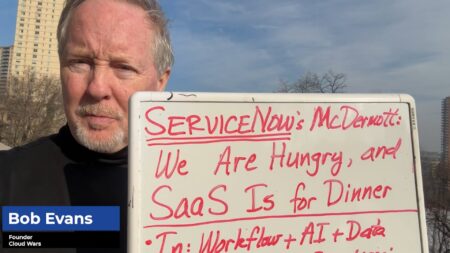Leveraging the big-time momentum generated by Oracle’s excellent quarterly results, chairman Larry Ellison and CEO Safra Catz used last week’s earnings call to reveal their intentions to aggressively pursue the red-hot category of industry clouds.
On my weekly Cloud Wars Top 10 rankings, Oracle is #6. And on my Industry Cloud Top 10, Oracle is #3.
Catz signaled Oracle’s intentions on the Dec. 9 earnings call when, early in her opening remarks, she included the category of industry clouds among her list of key drivers behind Oracle’s fiscal-Q2 surge.
“Before I go through the numbers, though, I wanted to comment on what we’re seeing in the market that is driving our accelerating revenue growth,” Catz said.
“As I’ve mentioned on previous calls, we have a highly differentiated strategy from our competitors where we are the only company able to offer the combination of applications and infrastructure in the cloud. We have best-of-breed capabilities in both infrastructure and apps like HR and ERP but also a highly differentiated set of industry-specific cloud SaaS applications.”
A moment later, Catz added this:
“Our unique capabilities are attracting customers, especially as they consider how to conduct their own digital transformation in the complex industries in which they compete. They want us to know as much about their business as they do, whether it’s telco, financial services, utilities, retail and many others and to partner with them to modernize.“
To the best of my knowledge and recollection, that is the very first time that Catz has cited industry-specific cloud apps as a strategic element of Oracle’s extensive portfolio during a high-profile earnings call.
Those broad perspectives from Catz set the stage for a more-extensive overview from Ellison, who artfully uses these earnings calls to reveal and push his and Oracle’s agenda for the months and quarters to come.
While every CEO does this to some extent, Ellison has become particularly adept at it over the past few decades as CEO and, for the past 7 years, chairman of Oracle.
And here are a few classic examples that showcase how Ellison is fusing one highly strategic and wildly successful product line—Fusion ERP—with a newly crowned highly strategic product line: industry-specific solutions.
After talking at length about Fusion ERP and its widespread success in the marketplace—its revenue for the quarter ended Nov. 30 jumped 35% to almost $1.25 billion—Ellison interconnected the industries phenomenon, but did so in his own unique way.
“I’m going to turn a little bit and describe what’s going on in the marketplace kind of from an industry perspective,” Ellison said.
“By now, Fusion ERP has been out for a while and we’re beginning to roll up entire industries. On an earlier quarterly call I said our two largest and most strategic industries going forward in ERP would be banking and healthcare. And maybe that’s not just for ERP but for the entire company, those would be banking and healthcare.”
Ellison then rattled off a long list of financial-services customers including JPMorgan, Bank of America, Bank of New York Mellon, HSBC, State Street, NatWest, Santander, and Macquarie.
Ellison then described the healthcare industry as “on par with banking in terms of the importance to our future,” and cited go-lives at Kaiser and Cleveland Clinic as well as a new contract with Mayo Clinic, which Ellison called “the number-one ranked hospital in the United States.”
He also cited big wins in the logistics industry at UPS, DHL, and FedEx, which Ellison said is live on Fusion ERP in 98 countries.
And then things got really interesting: “We’re winning in lots of other industries as well but I wanted to highlight these three because they are essential to our plan to add major new capabilities to our cloud ERP system,” Ellison said in outlining his plans to (a) interconnect Fusion ERP with Oracle’s huge portfolio of industry-specific solutions and (b) engage intimately with customers to cocreate this new generation of industry solutions.
In fact, this new model of cocreation with customers is so vital to Oracle that Ellison even used the word “partners” rather than “customers” to describe this collaborative breakthrough.
“We are working in concert with our banking and logistics partners to originate purchase financing, product shipment, delivery tracking, invoicing and payments right inside Oracle Cloud ERP procurement systems,” Ellison said.
And that kicks open the door to a whole new position for and capabilities within this next-gen ERP suite that not only orchestrates the internal operations of a company but also adds powerful new external-facing applications and solutions. For more on that, please see How Larry Ellison Will Build Oracle Cloud ERP Into a $30-Billion Business.
“Oracle Cloud ERP will soon bring an entirely new level of automation to B2B commerce in a way that resembles very closely the ease of doing business and efficiency of B2C e-commerce.
“This new ERP automation system and all these new capabilities will dramatically simplify our customers’ procurement and supply-chain processes,” Ellison said.
“And as such, it represents a huge new opportunity for Oracle to grow its Cloud ERP ecosystems.”
So it looks like next-gen ERP systems and the industry-cloud phenomenon are going to become their own new thing in 2022.
Which is one more reason to feel certain that in 2022, the biggest winner in the Cloud Wars will be the customers who get to benefit from not only this innovation but the comparable waves of innovation sure to come from Oracle’s competitors.








